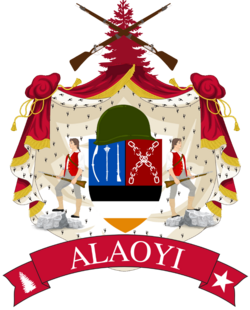Alaoyian Senate
Alaoyian Senate 3 official names
| |||||||
|---|---|---|---|---|---|---|---|
| 9th Alaoyian Senate | |||||||
| Type | |||||||
| Type | Lower | ||||||
| History | |||||||
| Founded | July 13, 1987 | ||||||
New session started | 8 January, 2024 | ||||||
| Structure | |||||||
| Seats | 672 Senators 337 seats for a majority | ||||||
 | |||||||
Political groups |
| ||||||
| Elections | |||||||
Last election | 19 November, 2018 | ||||||
Next election | 20 November, 2023 | ||||||
| Meeting place | |||||||
 | |||||||
| Federal Capitol Building Seekant | |||||||
The Alaoyian Senate , commonly referred to as simply the Senate, is the lower house of the parliament of Alaoyi. According to the Alaoyian Constitution, the Senate "is the representative assembly of all Alaoyian citizens". The constitution names the Senate as the country's organ of democratic authority.
Powers and Duties
The Senate's powers derive from its ability to dismiss a president through impeachment (requiring a majority to begin trial and two thirds to remove), to change the country's laws, and to amend the constitution (which requires a majority of two-thirds and the consent of the National Council). In addition to these key powers, the constitution grants to the Senate extensive legislative powers and substantial control over the budget, the right to authorize the government to raise taxes and grant loans, the power to ratify treaties and other kinds of international agreements, and the duty to declare war and make peace. The Senate also approves the apointment many members of important state institutions.
The constitution requires the Senate to quickly review and approve an incoming government's program. Parliamentary rules allow the Senate to call for committees of inquiry to examine the government's actions. Political opposition represented in the assembly has the power to review the cabinet's actions, even though it is unlikely that the actions can be reversed. Party groups can also call for interpellations that require debates about specific government policies.
Structure and Election
The assembly originally consisted of 100 members of the General Assembly, but the constitutional reforms of 1996 increased its number to 300 and then to 450 in 1999. Distribution of districts was changed in 2016, increasing the Senate to its current number of 672 senators.
Every subnational entity receives a minimum of four senators. These 272 spots are considered "guaranteed" senators. The remaining 400 senators are distributed according to share of the population in blocs of four, with a subnational entity that has 8% of the population receiving 8% of senators. Within each entity, votes are distributed proportionally.
Parties representing recognized national minorities (currently Marchan, Inith, Vanhish, and Ikhetese) are exempt from both the 5% threshold and the basic mandate clause, but normally only run in provincial elections.
